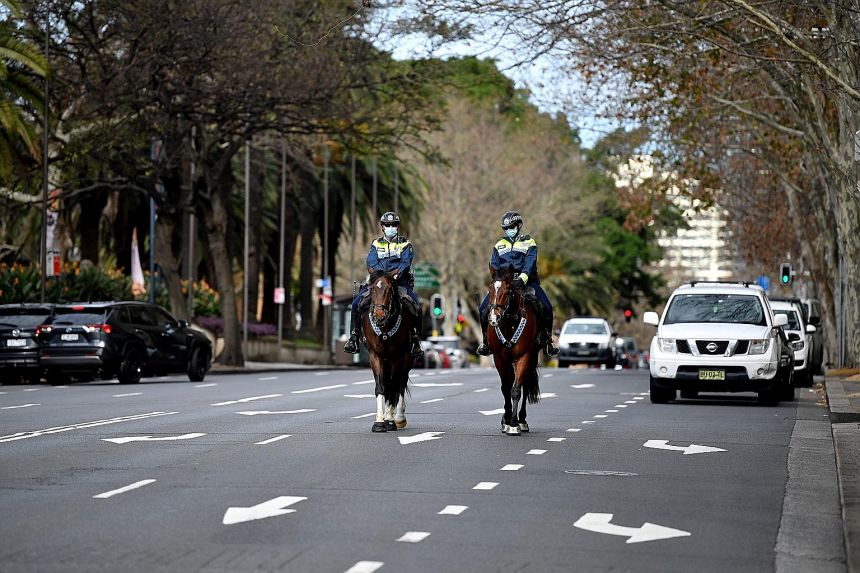Sydney to extend Covid-19 lockdown as strict measures fail to conquer Delta strain
Sign up now: Get insights on Asia's fast-moving developments

Mounted police on patrol in the central business district of Sydney, New South Wales, on July 25, 2021.
PHOTO: EPA-EFE
SYDNEY - Gripped by a worsening Covid-19 outbreak, New South Wales (NSW) is facing a four-week extension to its current lockdown, which was due to end on Friday (July 30).
Australia's most populous state has quickly discovered that previous methods of suppressing outbreaks are not working against the Delta strain.
Its case numbers have continued to climb in recent days, reaching 172 new local infections on Tuesday - a record during the current outbreak.
The outbreak has been the worst in Sydney since the first wave last year, with infections rising despite a strict lockdown and record testing levels. Schools and non-essential workplaces, including the massive construction industry, are currently shut.
Two deaths were recorded on Tuesday, and the NSW government warned that further deaths are likely as the epicentre shifted across Sydney towards the city's west. The state has 169 infected patients in hospitals, including 46 in intensive care.
NSW Premier Gladys Berejiklian is reportedly planning to announce a four-week extension to the lockdown on Wednesday.
Of the latest 172 cases, just 61 were in isolation while infectious.
"Obviously the number of people infectious in the community is not where we needed to be," Ms Berejiklian told reporters on Tuesday.
"What the New South Wales government is now considering, based on the health advice, is what the best settings are for us moving forward."
Until the latest outbreak, NSW, which has about 8.2 million residents, had prided itself on its handling of Covid-19. Its use of contact tracers, mass testing, travel curbs, and minimal lockdowns have repeatedly helped to suppress outbreaks.
But the same methods are no longer succeeding against the Delta strain, which has led to multiple clusters and has tended to result in almost all family members becoming infected. The Delta strain also tends to make people sick more quickly, leaving less time for contact tracing and isolation to succeed.
Under the extended lockdown to be announced on Wednesday, construction will reportedly be allowed to resume, except in hot-spot areas.
Single people will be allowed to have social contact with another chosen person as part of a "single bubbles" plan to support their mental health due to the lengthy lockdown, which has already been in place for more than a month.
Some health experts have been urging the state government to impose tougher measures, such as a night-time curfew, compulsory outdoor mask-wearing, or stricter limits on travel. Currently, people are allowed to exercise within 10km of their homes.
But some experts believe the current measures are containing the exponential spread of the virus and that case numbers may soon come down.
The difficulty facing the NSW government is that the national vaccination roll-out has been slow.
As at Tuesday, just 13 per cent of Australia's residents had been fully vaccinated and 31 per cent have had one dose.
But Canberra has failed to secure sufficient doses to ensure that NSW can rapidly boost its vaccination rates.

Outside Sydney, most of the country is largely free of local infections.
A lockdown in Victoria, the second most populous state, is due to end on Wednesday after almost two weeks, though masks will remain compulsory and household visits will be banned for a further two weeks. The state recorded 10 cases on Tuesday, though all had been isolating while infectious.
The state of South Australia will end a week-long lockdown on Wednesday after recording no new cases on Tuesday.
The rest of the country had no new local cases on Tuesday.
Ms Berejiklian has made it clear that she sees a mix of restrictions and high vaccination rates as the "recipe for freedom". But the low vaccination rates mean that she must press on - for now - with strict measures designed to lower infection rates.
"Vaccination is the key to our freedom," she said.
"I want August to be the month where everyone comes forward to get the jab. That is key to us being able to see what September looks like."


